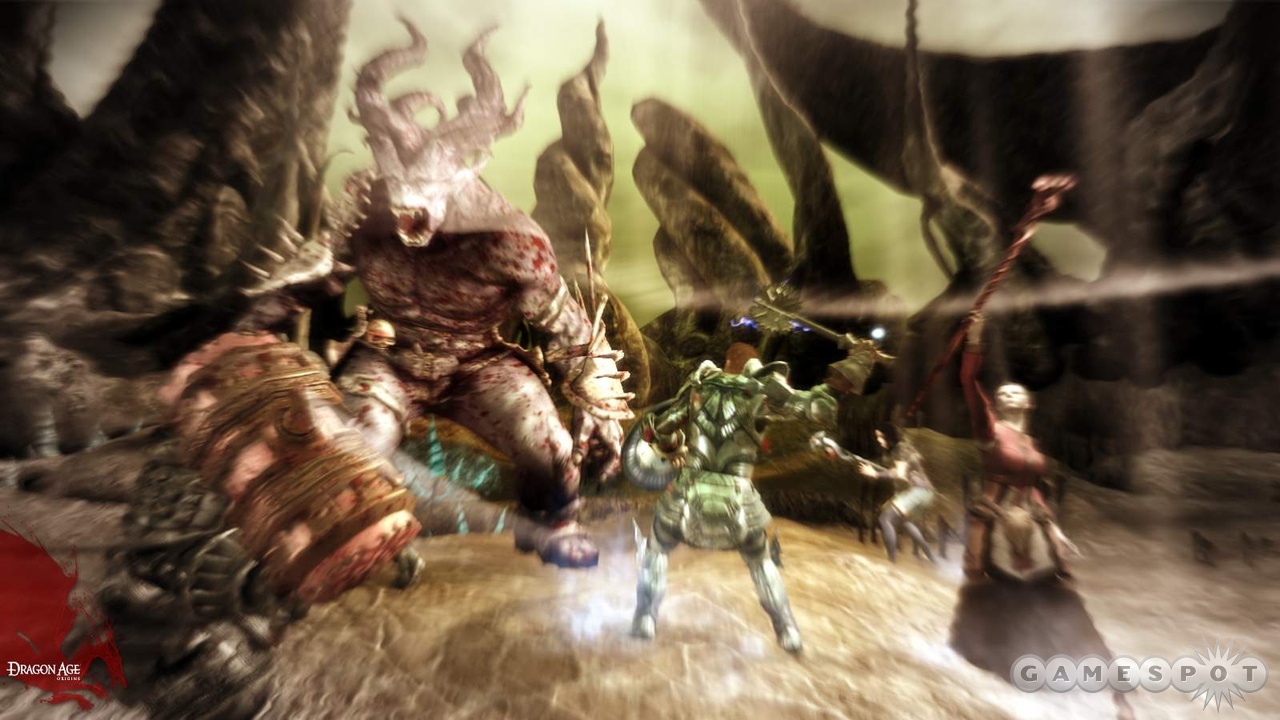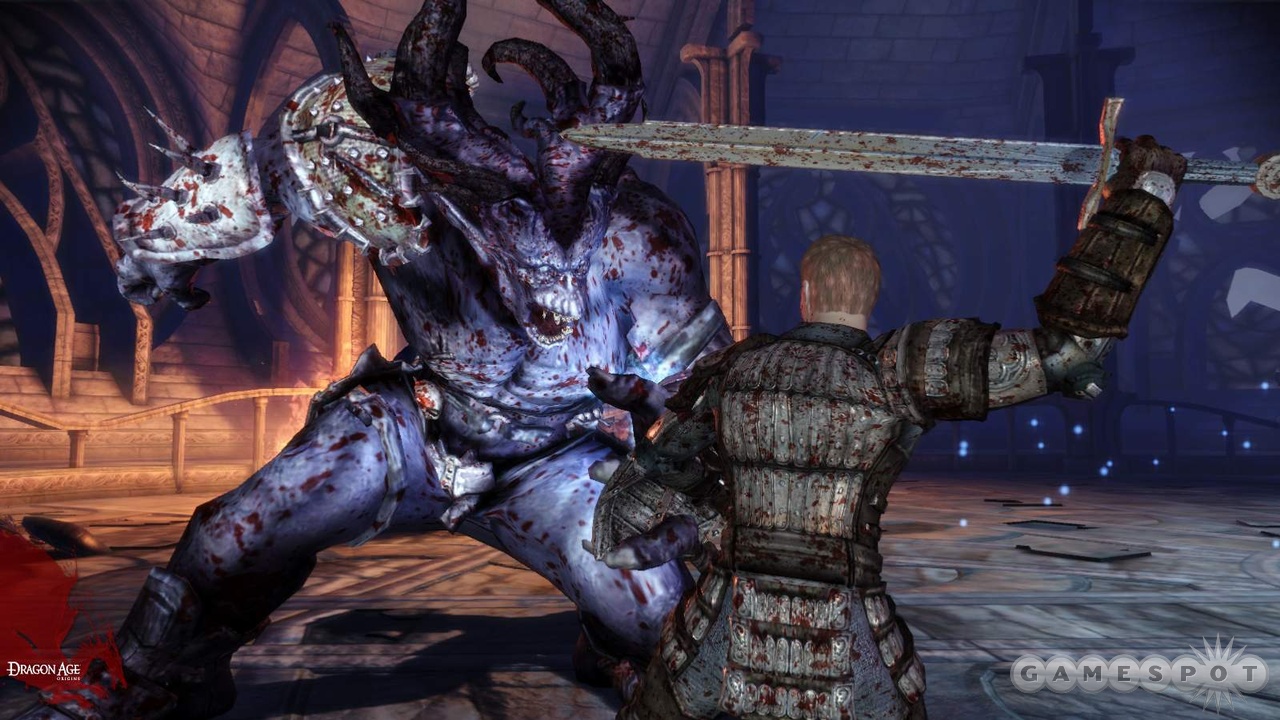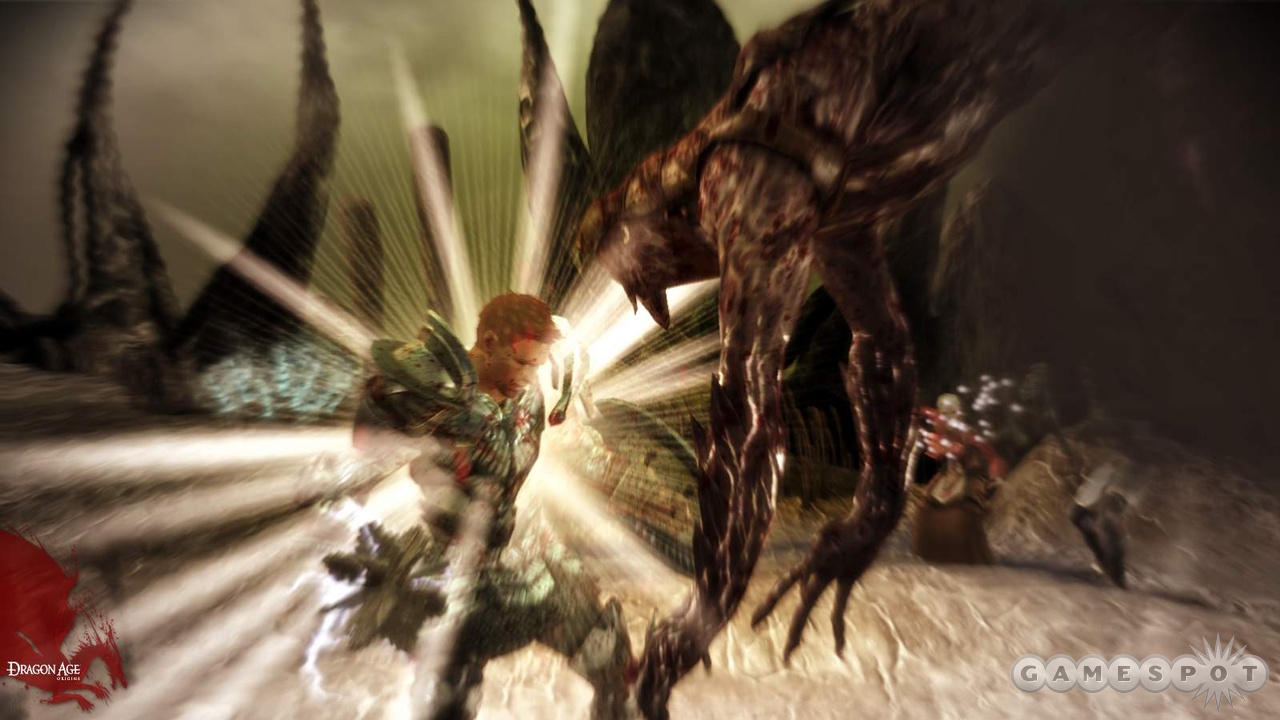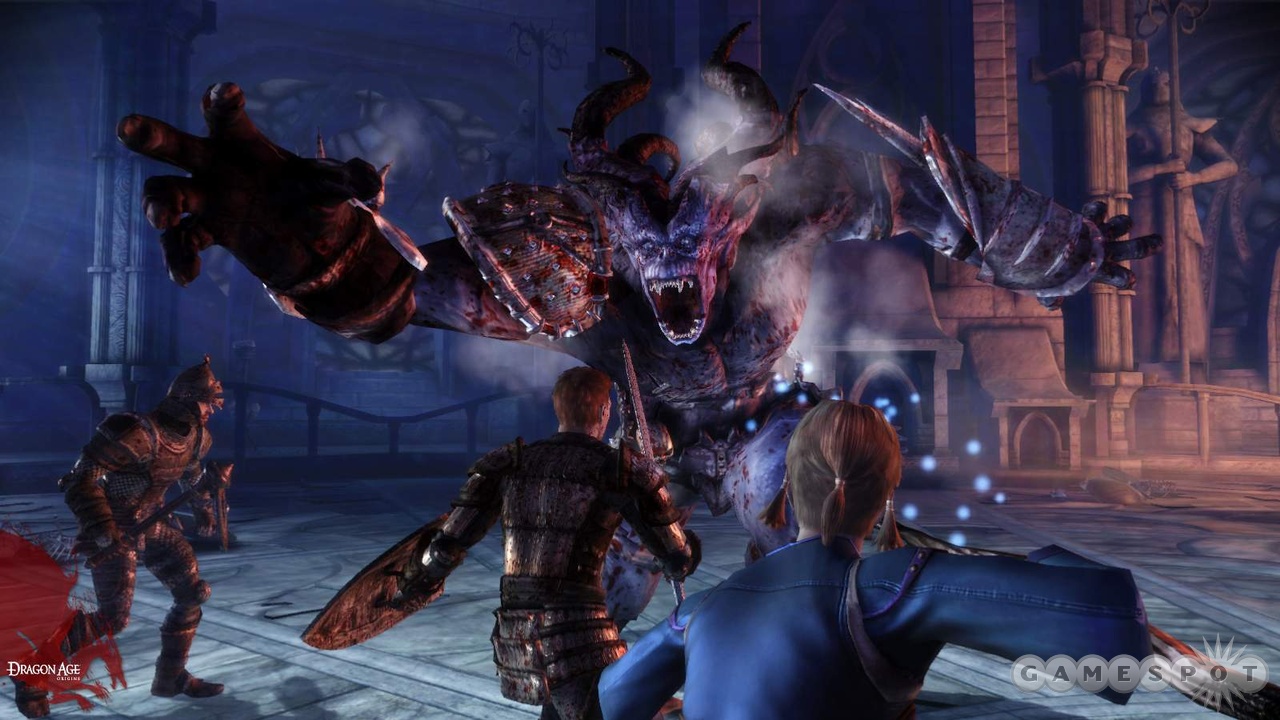Dragon Age: Origins Updated Hands-On - The Origins of the Human Mage
Developer BioWare suggests that Dragon Age: Origins will be a spiritual successor to Baldur's Gate, and we just got our hands on the first few hours of the wizard's origin.
Dragon Age: Origins is an epic fantasy role-playing game that tells a tale of a swords-and-sorcery world at war to stave off an invasion of corrupted monsters. It's also sitting right here on the hard drive of our PC. We started a new game to watch an elaborate cinematic sequence that began with animated pictures on what looked like aged vellum paper--a throwback to the introductory cinematics of Baldur's Gate II. The paintings gave way to a vicious in-engine battle between Duncan--a swordsman who presumably acts as your advisor at least in the early going--and a pair of hideous darkspawn, the monstrous humanoids who are invading the land. By starting a new game, we went straight to the character generation screen to play through an "origin" story. This early-game content begins after you choose a combination of the game's races and classes, which include humans, dwarves, and elves, and basic classes of fighters, mages, and rogues--and from there, you can choose a specific background for that class. We chose the human mage, whose only background is as a student in the mage guild, and away we went. Please note that this article pertains to a hands-on play session with the PC version of the game, and be advised that this article may contain minor story spoilers about the early part of the game.
Fallout 4 Next Gen Update Comparison ALIEN: Rogue Incursion - Announcement Teaser Trailer Stellar Blade - 13 Things I Wish I Knew S.T.A.L.K.E.R. 2: Heart of Chornobyl — Official "Not a Paradise" Trailer Sea of Thieves Season 12: Official Content Update Video Devil May Cry: Peak Of Combat | Dante: Blazing Tempest Gameplay Trailer Manor Lords - Official Medieval City Builder/RTS Launch Trailer Honkai: Star Rail - "Then Wake to Weep" | Version 2.2 Trailer SAND LAND — Official Launch Trailer Stellar Blade - Hard Mode No Damage Gigas Boss Gameplay Stellar Blade - Hard Mode No Damage Abaddon Boss Gameplay Stellar Blade - (Almost) All Outfits
Please enter your date of birth to view this video
By clicking 'enter', you agree to GameSpot's
Terms of Use and Privacy Policy
Starting a new character as a mage will take you through an elaborate creation process that lets you allot statistic points to your character's ability scores. These include strength (which affects your melee attack ability), dexterity (which affects your speed and defense), willpower (which affects your maximum magic pool), magic (which determines how effective your magic spells are), cunning (which affects your stealth abilities), and constitution (which affects your character's overall health). Dragon Age's human mage characters begin their lives with statistics in the 10- to 20-point range, with points primarily clustered in the willpower and magic stats. At the beginning, you can allot five additional points (and with each experience level, three more points). Increasing your attributes to certain levels will not only make your character more powerful, but will also let you access higher-level skills along the game's elaborate personal skill tree. Like the pen-and-paper role-playing systems you might have seen, Dragon Age has a list of miscellaneous personal skills to which you can allot points. These include coercion (which lets you flatter or threaten your way through a conversation), stealing (which lets you pick other characters' pockets), trap-making (which lets you create deadly traps), survival (which helps your character better deal with animals and survive harsher elements), herbalism (the game's version of herb-collecting alchemy), poison-making (which lets you create various types of venom), and combat tactics (which lets you set specific scripts for your party members who aren't in action).

Once you've chosen your skills, as a mage you can choose your character's spell specializations from five different options. These include arcane spells, which appear to be the most stock-standard of the mage's spells (including such selections as arcane bolts, with which you begin the game, and a continuous magical shield); the "primal" line, which includes elemental damaging spells of fire, ice, and lightning; creation, which includes various healing and defensive spells; spirit, which contains spells that pertain to manipulating your own or your enemies' spell power (or "mana"); and entropy, which contains various curses that "de-buff" your foes. We chose to start with the spirit line with the close-range "mind blast" spell that stuns nearby foes, but there are a great variety of different spells here that will let you create either a powerful specialist or a well-rounded generalist. And fans of the Baldur's Gate series will be happy to see analogs to classic tactical magic spells from Baldur's Gate II, such as fireball, grease, and Otiluke's Resilient Sphere. We then moved on to the customization of our character's appearance, which lets you choose different voices, as well as different hair and facial features (or choose from a series of premade looks). After selecting our appearance, we were off and ready to start our adventure, which began with an argument between Irving, the senior wizard at our mage tower, and Gregoir, the angry sergeant who leads the templars that guard the tower. According to the setup, the mages study in seclusion to better learn to use their powers, but they are guarded closely, if not imprisoned, by the templars, who are authorized to cut down any wizards who are corrupted by the Fade--a magical netherworld that people visit when they dream, and from which mages gain their power, but which also houses demons with connections to the darkspawn. There's clearly a great deal of tension between the two parties that's conveyed well in the dialogue and that sets the stage for more political conflicts in the game--as you poke around the mage's tower, you'll even encounter characters engaged in political discussions, such as one group of senior mages who suggest that there are multiple factions of wizards with different ideas on how close mages should live to the world of non-mages.
Politics aside, we dived right into our first task as an apprentice--completing a rite of passage known as "the Harrowing," which requires all stripling mages to enter the Fade. So, in we went, to find a hazy dreamworld where a handful of hostile spectral monsters attacked us so that we could get the hang of the combat system. Like in previous BioWare games, there's an auto-attack feature that lets you attack the nearest targeted enemy, though your other abilities, such as spells, work off a cooldown timer and can be tied to a hotkey bank, similar to the standard abilities you'd expect from a massively multiplayer game. The first enemies we faced weren't much of a challenge--the key characters we met were much more interesting. The first such character was a talking rodent who turned out to be an embittered apprentice mage that later took human form to speak with us. He explained that he, like us, had taken his test but had dallied too long in the Fade, which led the Templars to kill off his physical body, even though his spiritual form in the Fade had gained the ability to change shape. After a brief conversation, he joined us as a companion in the hopes of somehow escaping and suggested he could provide additional insight along the way.

We then continued our test, meeting an ethereal spirit of valor, who was busy forging spectral weapons. When spoken to, the spirit openly questioned our character's courage--a dangerous mistake on his part, since we were equipped with Dragon Age's branching dialogue system, which let us use a willpower-based dialogue option to convince him of our conviction and persuade him to hand us a spectral staff. We also met a slumbering demon of sloth, a talking bear with bloodied jaws who spoke with us without bothering to lift his lazy head. Though the demon absently muttered something about devouring us both, our shape-shifting companion, Mouse, asked the creature to teach him how to change into a bear, and after some practice, Mouse was able to do so. The demon then explained that it was time for him to destroy us, though we were able to talk him down to playing a game of riddles in exchange for our lives.
However, we got the answer to the first riddle wrong, which prompted the monster to attack us. Our shiny new staff and Mouse's bear form helped us barely survive the encounter. In fact, we started feeling like we'd gotten the hang of things at this point and strode boldly toward our final encounter in the Fade, which was a powerful demon who blocked our exit. When we confronted this final creature, it suggested that it had made previous deals with Mouse to betray and devour other apprentices that had come before us, but Mouse stood resolute at our side and we leapt into battle, dispatching the beast with ease and ready to return to the mage tower. Just before leaving, Mouse suggested we could help him an additional time...by lending him our physical body, you know, just for a minute, to help him escape. We saw through the ruse more or less immediately and stated to him that his final favor seemed like it might have been the real test. Mouse agreed, changing shape to an enormous demon as everything faded to black.

When we awoke in the mage tower, we found that we had gained an experience level and three attribute points to spend. We also gained additional slots for spells and skills, and got a glimpse at some of the more-advanced classes that human mages can eventually become, such as shape-shifter (a profession that changes to different animal forms), spirit healer (a healing profession), arcane warrior (a mage/warrior hybrid), and blood mage, a feared class of wizard that uses ghastly death-based magic in battle--though changing to a specialized class will happen long after completing a character's origin. Once we attended to our new skills and abilities, we spoke with a nearby initiate, Jowan to find that we had passed our Harrowing test all right but that Jowan was dissatisfied about not being tested yet himself. We excused ourselves from the conversation to begin searching for senior wizard Irving--who would give us our next instructions--but not before exploring the mage tower first. Running to and fro through the circular tower, level by level, and poking around in the odd armoire or chest (all of which were thankfully unlocked) for healing poultices and mana-restoring powdered lyrium (the most potent magical substance in the realm) seemed very reminiscent of our experiences in the original Neverwinter Nights' initial training hall, though Dragon Age's mage tower actually has ambient characters who start full-on dialogue tree conversations that aren't critical to the story but that contain useful bits of lore to help you understand the world better, such as the aforementioned senior mages and their discussion of mage political factions. After finally finding Irving and meeting up with the grey warden Duncan, whom we escorted to his room, we embarked on the final story-related quest to end our origin story.
Apparently, mages who don't wish to be tested or who (rumor has it) are considered to be a threat to the mages are instead sent to the Rite of Tranquility, which cuts those mages off from the Fade permanently, robbing them not only of their magic powers, but also of their dreams and emotions. Without giving away all the details, we'll say that we were given the opportunity to help our fellow apprentice Jowan, who was suspected of being a blood mage, escape this fate. In order to escape, Jowan must first locate and destroy his phylactery, which is a blood sample taken from all fledgling wizards that will let them be tracked should they "go apostate"--that is, if they escape from the tower and begin illegally practicing wizardry on their own. We opted to help our comrade in his illicit quest, and during the course of it, we traded words and official documents with a creepily "tranquil" storekeeper, slew a pack of spiders for a forgetful elf enchanter, and snuck into the basement of the tower, where clanking armored guardians and ghostly wizards attacked us constantly. Our ragtag adventuring party finally broke into the phylactery room from a back entrance, seizing hold of Jowan's phylactery and encountering a bizarre talking statue occupied by the spirit of a long-dead demigod.
This victory was short-lived. We emerged from the phylactery room right into an antechamber where Irving, Gregoir, and Duncan stood in wait for us, and we were found guilty of any number of magely crimes on the spot. In a fit of desperation, Jowan escaped--further adding to our crimes because he went apostate without a phylactery to track him. Irving also noted that we'd discovered a brand-new magic staff in the basement that was slightly better than any others we'd had before, and though we could have tried to lie our way out of the situation, we decided to simply relinquish the item since we'd been caught red-handed. Nevertheless, while Gregoir was furious, Duncan was impressed by the lengths we were willing to go to help a friend (let's face it, we were only in it for the experience points) and recruited us for the grey wardens--a singular honor, since the wardens typically recruit so few mages into their ranks. We agreed to our new charge to complete our wizardly origin story and couldn't wait to move on to the rest of the game. But that will have to be a tale for another time.

Though we've played through only the first two hours or so of the game, Dragon Age seems like it offers many nostalgic references to Baldur's Gate and Neverwinter Nights and also seems to have an intuitive interface and plenty of bits of hidden lore buried in the game if you care to dig them up. From the looks of things, the branching schools of magic for the mage class will also give you a lot of different ways to approach this profession, either as a full-on wizardly artillery unit who hurls fire and lightning, a tactical supporter who protects allies and hinders enemies, a healer, or some combination of the three. Dragon Age seems like it will have a lot to offer, and we can't wait to bring you more about the game. Stay tuned to GameSpot for our next hands-on update, next week.
Got a news tip or want to contact us directly? Email news@gamespot.com
Join the conversation